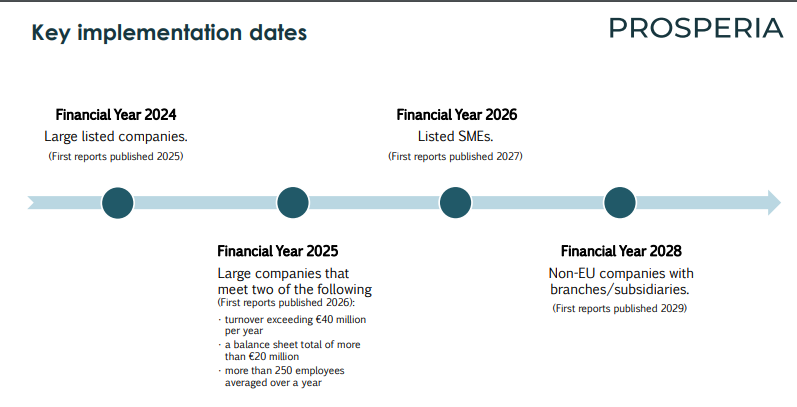EU CSRD –
Should you care about the
EU’s Corporate Sustainability
Reporting Directive?
by Dr. Eva Gkenakou

The Corporate Sustainability Reporting Directive (CSRD) aims to revolutionise our ability to tackle key Environmental, Social and Governance (ESG) issues through the availability of reliable data.
Currently, ESG data management and reporting face significant hurdles:
- Value chain-related ESG data is often not available, especially from SMEs, hindering the ability to set targets and monitor progress
- The data that is available is not easily accessible, as it is in different formats and therefore difficult to locate and extract for analysis and reporting
- Where data from several sources is needed, the data is often not comparable due to differences in the indicators used, which means it cannot be used
- The plethora of reporting standards makes it time consuming and costly for businesses to understand all the standards that apply to them and to disclose in line with each one
- Reporting on ESG matters is most often standalone, separate from the financial reporting and the connection of ESG to the business bottom line is therefore difficult to make and to quantify.
How will the CSRD help?
- Improves data availability from businesses that operate in the EU by mandating it for an estimated 50,000 businesses, four times the current number of businesses that are required to report
- Provides useful insights through requesting a double materiality view, which means disclosure of risks and financial impacts from ESG, as well as the business impact to ESG aspects
- Brings the significance of ESG home through moving ESG into the company financial reporting and through the inclusion of ESG-related financial risks and impacts information
- Enhances the quality of data introducing a single standard with common requirements, uniform and comprehensive metrics, including for Scope 3, and 3rd-party assurance
- Requires a prescribed structure for information, tagging and specifies a digital reporting format for all (XBRL)
- Makes it easier for businesses to understand what they need to report on and how. Plans reporting standards for SMEs that will be proportionate to them.
There are four main areas where the CSRD requires disclosures:
- General
- Environmental
- Social
- Governance.
The CSRD General Disclosures:
- Business model and strategy, (including resilience to risks, Paris alignment and transition plans
- Time-bound targets, including targets for carbon reduction by 2030 &2050 and if these are science-based
- The role of the administrative, management and supervisory bodies with regard to sustainability matters and any incentives offered for those matters
- Any action taken and the results
- Description of the principal risks to the business
- Indicators.
The CSRD Environmental Disclosures:
- Climate change mitigation, including as regards scope 1, scope 2 and, where relevant, scope 3 greenhouse gas emissions
- Climate change adaptation
- Water and marine resources
- Resource use and the circular economy
- Pollution
- Biodiversity and ecosystems.
The CSRD Social Disclosures:
- Equal treatment and opportunities for all, including gender equality and equal pay for work of equal value, training and skills development, the employment and inclusion of people with disabilities, measures against violence and harassment in the workplace, and diversity
- Working conditions, including secure employment, working time, adequate wages, social dialogue, freedom of association, existence of works councils, collective bargaining, including the proportion of workers covered by collective agreements, the information, consultation and participation rights of workers, work-life balance, and health and safety
- Respect for the human rights, fundamental freedoms, democratic principles and standards established in the International Bill of Human Rights and other core UN human rights conventions.
The CSRD Governance Disclosures:
- The role of the business’s administrative, management and supervisory bodies with regard to sustainability matters, and their composition, as well as their expertise and skills in relation to fulfilling that role or the access such bodies have to such expertise and skills
- The main features of the internal control and risk management systems, in relation to the sustainability reporting and decision-making process
- Business ethics and corporate culture, including anti-corruption and anti-bribery, the protection of whistleblowers and animal welfare
- Activities and commitments related to exerting its political influence, including its lobbying activities
- The management and quality of relationships with customers, suppliers and communities affected by the business activities, including payment practices, especially with regard to late payment to SMEs.
Key Implementation Dates:

What’s the impact?
The CSRD:
- Drives and enhances business’s ability to set and monitor Climate and wider ESG targets
- Enables ESG ratings, a key procurement and investment tool, to be more robust
- Makes supply chain and portfolio management easier.
It is expected to have a profound positive impact on transitioning to a more sustainable global economy.
About the author, Dr. Eva Gkenakou
Eva is the founder of Prosperia Consulting – and helps companies with challenging sustainability & ESG requirements to succeed in winning new customers, meeting legal obligations, and unlocking access to investment.
She has recently been partnering with B2E Consulting conducting a review of existing sustainability processes, procedures and skills sets at our client’s company, and developing an ambitious sustainable procurement strategy to support their net zero commitment and the reduction of Scope 3 emissions from their supply chain.







